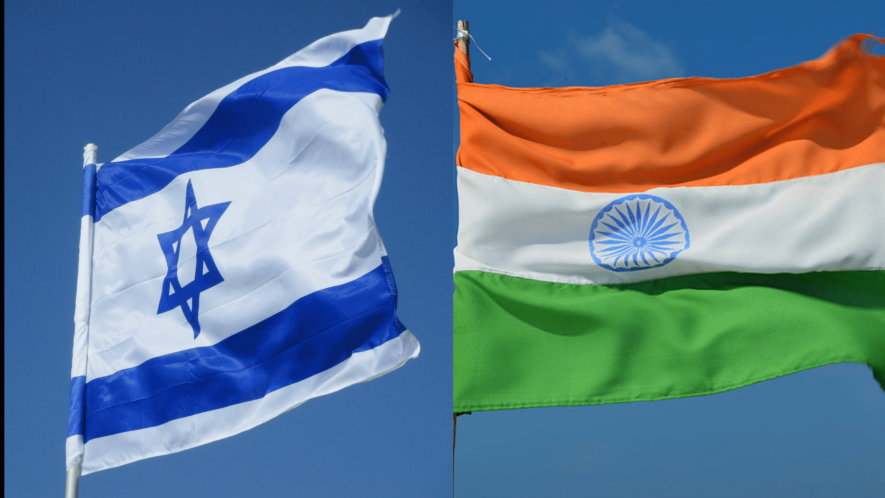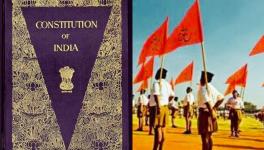Blurring Separation of Powers: Uncanny Similarity Between India, Israel

Image Courtesy: Wikimedia Commons
The old English proverb ‘Birds of a feather flock together’ can easily be altered to ‘Populists of the world walk the same talk’.
This has become more starkly evident in recent weeks after the Benjamin Netanyahu-led Israeli government continued pursuing—despite unprecedented public protest—the grossly anti-democratic move to curtail the judiciary’s powers and provide unmitigated supremacy to the executive.
After forming Israel’s most right-wing government in November 2022 with the thinnest possible majority, the government, egged on by extreme right-wing parties in the Likud-led coalition, has embarked on a judicial ‘reforms’ package that would incontrovertibly undermine the judiciary’s powers.
Barring minor concessions on certain clauses, the Netanyahu regime has been unrelenting in pursuing its proposals, uncannily similar to the Narendra Modi government’s onslaught on the judiciary with the combine of vice-president (V-P) Jagdeep Dhankhar and Union law minister Kiren Rijiju acting as the veritable ‘forward line’.
Not just legislation pertaining to gnawing the powers and independence of courts and Judges that were moved in the Knesset in recent weeks, the Israeli government has also embarked on finding legislative ways to expand settler footprint in occupied West Bank.
Although the Netanyahu government has backed down on its plans even after the Knesset passed second and third readings of the Bill allowing Israeli settlers to resettle in four illegal settlements, there is no indication in any weakening of its resolve to clip the judiciary’s wings.
The hostile proposal enhancing Israeli settlements in the West Bank has been kept in abeyance as a result of emphatic condemnation by the US, which was among several other international blocs and organisations criticising the Netanyahu regime’s move.
Importantly, however, India, which was against efforts of previous Israeli governments to establish illegal settlements in the West Bank and on issues concerning Palestinians, chose to remain silent once again as in recent years.
For decades, especially after formally establishing relations with Israel in 1992, the year when it became evident that the BJP had the potential to get a shot at governing India, several similarities were discernible between the party’s stance on numerous domestic matters and far-right political parties in Israel.
As a reporter for a daily in May 1993, I reported on the visit of the then-Israeli deputy Prime Minister and foreign minister, Shimon Peres to India and his formal meeting with the then-Lok Sabha Opposition leader LK Advani.
In the meeting, Peres explained his government’s settlement policy and Advani reportedly evinced great interest in the matter. By 1993, it may be recalled that the Kashmir issue had emerged as a major internal security matter and subsequently, overenthusiastic Sangh Parivar leaders often called for ‘changing’ the Valley’s demographic profile.
Before going any further, a quick summary of the changes in Israel’s laws that the Netanyahu government appears determined to make, which is essentially a blueprint to terminate the judiciary’s independence.
On the top of the list of the proposed laws is a piece of legislation that will fundamentally alter the balance of power in the Judicial Selection Committee—in short, the body that appoints Judges.
First established in 1953 with modifications made over time regarding its composition, the Committee’s purpose was to prevent outside pressure and ensure that Judges were not aligned with any political opinion.
The nine-member Committee is headed by the justice minister. The other eight members are: a minister chosen by the government, two Knesset members—conventionally since 1992, one each is from the ruling and Opposition coalition— the Chief Justice, two other Judges of the Supreme Court and the last two from each faction of the Bar.
This ensures that the government or the executive does not enjoy majority. Under the new legislation, Israel’s government will have a 7-4 margin in its favour in the expanded Committee.
India’s Collegium System is similar in principle although not entirely in character to the Israeli Judicial Selection Committee. In recent months, the government repeatedly questioned the process of selecting Judges.
Dhankhar has even invoked the “tyranny” of the elected and contended that the executive or Parliament has mandate of the people whereas Judges never contest elections. Although no law has yet been introduced in India, the chatter against the Collegium System in recent months has a foreboding resonance.
The second Bill, which is part of the legislative proposals, strikes at the Israeli Supreme Court’s (SC) power of review of laws passed by the Knesset. The Israeli legislature shall have the power to overturn by a simple majority any ruling of the Court which nullifies a law previously passed by the Knesset. This will make legislature as the supreme arbitrator of all laws.
The Indian V-P wishes similar powers for Parliament. It is worth recalling that when Dhankhar fired his first salvo last December, he slammed the apex court for striking down the National Judicial Appointments Commission Act and asked people to find out “a parallel in the world where a constitutional provision has been undone.”
The Israeli government’s third proposal, again disturbingly similar to an articulation of Messrs Dhankhar-Rijiju and Co, diminishes the SC’s power to strike down laws it considers incompatible with the country’s quasi-constitutional Basic Laws.
Quite similar to the SC’s 1973 ruling in the Kesavananda Bharti case, where the Constitution’s basic structure was spelt out and given sanctity, Israel’s SC ruled in 1995 that the court was well within its rights to nullify any Knesset legislation not compatible with two of the country’s Basic Laws and later this was expanded to include all Basic Laws.
Just as in India, where the basic structure doctrine in the aftermath of the 1973 verdict acted as a bulwark against efforts to undermine the foundational constitutional principles, the 1995 ruling in Israel was utilised by courts to protect human rights and the territories it controls.
This verdict was also a thorn in the flesh for the Israeli right-wing, which, strikingly similar in India, sees sections of the court as either self-perpetuating or as have a left-wing tilt.
The 1995 ruling spelt out unambiguously that “the Basic Law: Human Dignity and Liberty, approved in 1992 by a simple majority, had semi-constitutional status and that the court could therefore annul laws passed by the Knesset if they were incommensurate with that Basic Law.”
According to an Israeli media report, between the verdict and now, Israel’s SC annulled 22 laws or clauses within the law passed because the principles of the Basic Laws were violated.
All laws or sections struck down by the Court aimed to either constrict human rights and the rule of law, including the Knesset’s democratic functioning and the freedom of assembly and protest or grant powers to the executive to indefinitely detain asylum seekers and migrants and override property rights of Palestinians in the West Bank.
The report, which appeared in The Times of Israel in November 2022, forewarned that the Netanyahu government’s coalition partners were “strong, if not ardent, proponents of radically overhauling the principle of judicial review in the Jewish state. At stake is the ability of the High Court of Justice to strike down legislation that it deems is in violation of the human and civil rights stipulated in Israel’s Basic Laws...”
Likewise, Dhankhar has outrageously claimed that “there was ‘no such thing’ as the basic structure.”
Voices that do not support the Netanyahu government’s judicial overdrive contend that Israel’s founders were motivated by “an unshakable determination to build a state in which they could live freely and openly within the diverse religious and secular confines of Judaism”.
One can disagree with this formulation—especially regarding the initially intended diversity—but these words effectively paraphrase the dream of India’s founding leaders. For decades, Indians were united in their resolve for a state that was known for its unmitigatedness when it came to ensuring social justice and democracy.
There is little doubt that the Indian government has matched, almost step by step, the Israeli government’s push for a legislative package that would hollow out the practice of separation and balance between the legislative, executive and judiciary.
One of the main planks of the Modi government to justify its decisions that have corroded India’s institutional framework is that this has made the nation and the state strong whereas previously, especially in the coalition era, it was weak.
But while people were strong previously when polity was ostensibly ‘unstable’, they are not unmistakably weakened now having unfortunately got somewhat taken in by the terrifying concoction of a majoritarian ideology wrapped in a nationalistic narrative with hatred for the imaginary ‘other’ acting as both glue and opium to overlook the emptiness in their bellies and the absence of a permanently rewarding and growth-oriented economic pursuit.
Critics of the Netanyahu government hope that Israel’s diplomatic and economic strength will be globally undermined if its democracy begins flailing and this would make it imperative for the government to abandon its push to undermine the judiciary.
They also draw hope from the consistent resistance and protests from people who resolutely mounted ‘Day of Paralysis’ or ‘National Silence Day’ on several occasions these past few weeks.
Indians have also pushed back, most significantly even after Modi’s re-election in 2019. No one could anticipate that the anti-CAA agitation or the farmers’ stir would become major mass movements and rock the government with a 300+ majority in Lok Sabha.
There are parallels aplenty between Israel and India—starting with being a nation based on the basis of religion to our country now moving inexorably in that direction with a strong prejudice against another religious community.
But there is always scope for another similarity in the future— hopefully to the seething anger now palpable on the streets of Tel Aviv and other cities of Israel.
The writer is a NCR-based author and journalist. His latest book is ‘The Demolition and the Verdict: Ayodhya and the Project to Reconfigure India’. He has also written the books ‘The RSS: Icons of the Indian Right’ and ‘Narendra Modi: The Man, The Times’. He tweets at @NilanjanUdwin
Get the latest reports & analysis with people's perspective on Protests, movements & deep analytical videos, discussions of the current affairs in your Telegram app. Subscribe to NewsClick's Telegram channel & get Real-Time updates on stories, as they get published on our website.
























